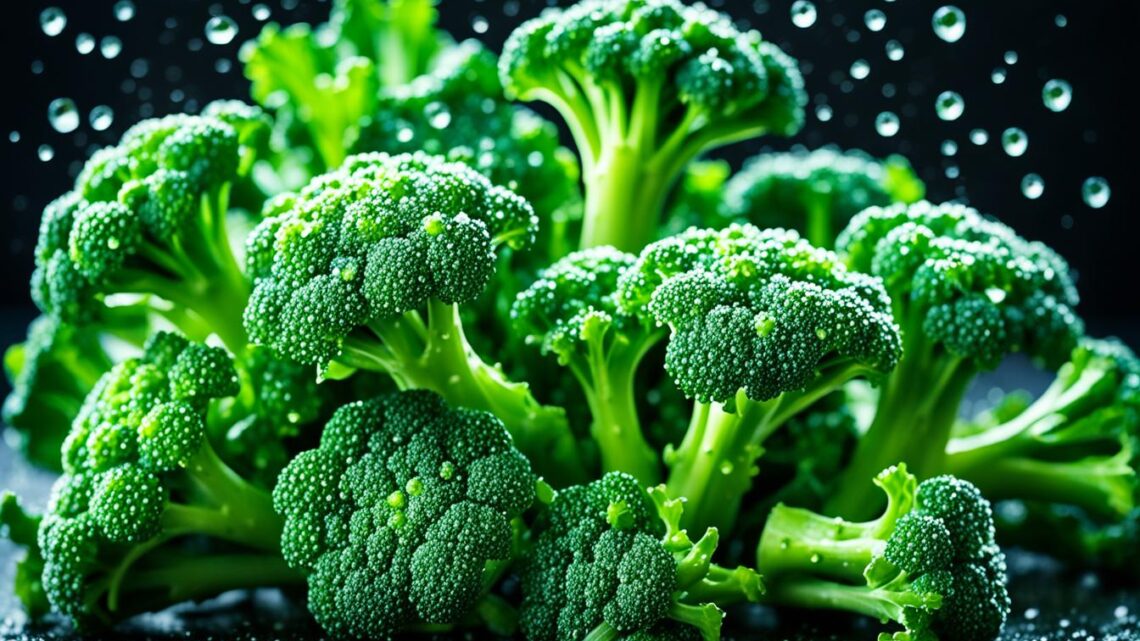
Ever wondered why broccoli is called a «superfood»? It’s part of the cruciferous family, like kale and cabbage. Let’s explore why broccoli is so great for your health.
Broccoli is full of vitamins, minerals, fiber, and antioxidants. A single cup gives you 3.5% of your daily calcium, 54% of vitamin C, and 86% of vitamin K. It’s also a great plant-based protein source, good for any diet.
But there’s more to broccoli. It’s full of fiber, which helps your digestion and keeps you feeling full. Eating a lot of fiber can lower your risk of heart disease and bad blood fats. Want to know more about broccoli’s health benefits? Keep reading.
Broccoli: A Nutritional Powerhouse
Broccoli is a nutritional powerhouse. It’s full of vitamins, minerals, and antioxidants that boost your health. Eating one cup (91 grams) of raw broccoli gives you lots of important nutrients.
- Vitamin C (135% of the RDI)
- Vitamin K (116% of the RDI)
- Folate (14% of the RDI)
- Potassium (8% of the RDI)
- Phosphorus (6% of the RDI)
Broccoli also has antioxidants like glucoraphanin. This turns into sulforaphane in your body. It’s also a good source of lutein and zeaxanthin. These help keep your eyes healthy.
Broccoli is full of fiber, giving you 2.4 grams per cup. Fiber is good for your digestion and can make you feel full. This makes broccoli a great choice for a healthy diet.
Broccoli’s Antioxidant Potential
Broccoli is a nutritional powerhouse, full of good stuff for your health. It’s known for its high antioxidant levels. These come from glucoraphanin, which turns into sulforaphane in your body. Sulforaphane and other compounds like kaempferol help fight inflammation.
These antioxidants in broccoli fight off bad free radicals and lower oxidative stress. This can protect your cells and tissues. Studies show that broccoli extracts are full of antioxidants. They have a lot of phenolic content and sulforaphane.
Broccoli is also great at fighting oxidative stress. It has a high ORAC value, which means it’s full of antioxidants. This makes it a top choice for fighting disease and keeping you healthy.
| Bioactive Compound | Content | Antioxidant Capacity |
|---|---|---|
| Total Phenolic Content | 35.5 mg gallic acid equivalents/g | – |
| Sulforaphane | 620.2 μg/g | – |
| Oxygen Radical Absorbance Capacity (ORAC) | – | 1,588.7 μM Trolox equivalents (TE)/mg |
Broccoli and Cancer Prevention
Broccoli and other cruciferous vegetables have antioxidants and compounds that may prevent cancer. Sulforaphane and indole-3-carbinol in broccoli are studied for their chemopreventive effects.
Studies show that eating cruciferous vegetables may lower the risk of breast, prostate, and other cancers. But, we need more research to be sure. Since 1997, broccoli sprouts have been found to have anticarcinogenic properties.
Sulforaphane in broccoli can help prevent prostate, breast, and other cancers. Carotenoids in broccoli fight diseases and boost the immune system. Vitamin C also protects cells from harmful free radicals.
Indole-3-carbinol (I3C) in broccoli can stop an enzyme that hinders a cancer-suppressing gene. This research could lead to new cancer treatments. The National Institutes of Health support this study.
Eating a lot of broccoli to get I3C isn’t practical. Pills might be used instead. We need more studies on safe doses and effects of I3C supplements.
Broccoli and other cruciferous vegetables could help prevent cancer. Research is ongoing to understand how they work.
Broccoli for Better Blood Sugar Control
Broccoli is a superfood that can help manage blood sugar, especially for people with diabetes. It’s full of antioxidants and fiber. These can help improve diabetic care.
Supporting Diabetic Management
A study showed that eating broccoli sprouts daily for a month helped people with type 2 diabetes. It made insulin work better. Another study found broccoli extract lowered blood sugar and protected pancreatic cells in rats with diabetes. The fiber in broccoli helps control blood sugar too.
Broccoli has less than 6 grams of carbs per 1-cup serving, making it good for diabetes. It’s also very hydrating, with about 90% water. You can get a fresh broccoli crown for less than $1.50 or 2 pounds of frozen broccoli for $3 at Walmart.
SmarterNaturally’s broccoli has a lot of glucoraphanin, which is good for your metabolism. Their dried instant soup has more glucoraphanin than regular broccoli. This makes it a great choice for managing blood sugar.
Eating broccoli and other foods that help control blood sugar is good for diabetes. Foods like seafood, pumpkin, nuts, and berries can also help. Adding broccoli and these foods to your diet can improve your blood sugar and health.
Promoting Heart Health with Broccoli
Broccoli is a green superfood that can help your heart. It’s full of vitamins, minerals, and antioxidants. These can improve your cholesterol and triglyceride levels. These are important for heart health.
Studies show that eating broccoli often can lower bad LDL cholesterol and triglycerides. It can also raise good HDL cholesterol. The antioxidants in broccoli protect your heart tissue. This lowers the risk of heart attack.
Broccoli is also high in fiber. Fiber can lower the risk of heart disease. It helps control blood sugar and supports healthy digestion. Both are key for a healthy heart.
| Nutrient | Amount per Cup (Raw) | Percentage of Daily Value |
|---|---|---|
| Calories | 31 | – |
| Carbohydrates | 6 g | – |
| Fat | 0.3 g | – |
| Protein | 2.6 g | – |
| Vitamin C | 81 mg | 90% |
| Vitamin K | 93 μg | 78% |
| Folate | 57 mg | 11% |
| Potassium | 288 mg | 6% |
| Magnesium | 19 mg | 5% |
Broccoli’s nutrients and compounds support heart health. Adding more broccoli to your meals is a great step for a healthy heart.
Broccoli: A Brain-Boosting Superfood
Broccoli is a superfood that supports brain health and cognitive function. It’s full of nutrients that protect the brain and slow down mental decline.
Kaempferol, a key compound in broccoli, has shown to protect the brain in animal studies. Kaempferol can shield brain tissue and reduce inflammation. This can help prevent cognitive problems. Sulforaphane is another compound that looks promising for brain health. It might help keep the brain healthy and even prevent diseases that affect the brain.
Eating just one serving of dark green veggies like broccoli daily can help keep your mind sharp as you age. While we need more studies on humans, the early results are exciting.
If you want to boost your brain health, add more broccoli to your meals. You can steam it, roast it, or toss it in a stir-fry. It’s a great way to eat for a healthy brain.
Broccoli and Healthy Aging
As you get older, your body deals with oxidative stress and slower metabolism. This can make you age faster. But, broccoli might help slow down this process. It has sulforaphane that boosts antioxidant genes. This can fight oxidative stress and help you age slower.
Oxidative stress is a big part of aging. Broccoli’s antioxidants like beta-carotene and sulforaphane help fight this. They neutralize free radicals and protect your cells. This may slow down age-related diseases and keep you healthy and vibrant.
We need more studies to know how broccoli helps with aging. But, what we know is promising. Eating broccoli can give you its antioxidants and sulforaphane. This could help you live a healthier, longer life. So, add broccoli to your meals often and enjoy its benefits for healthy aging.






